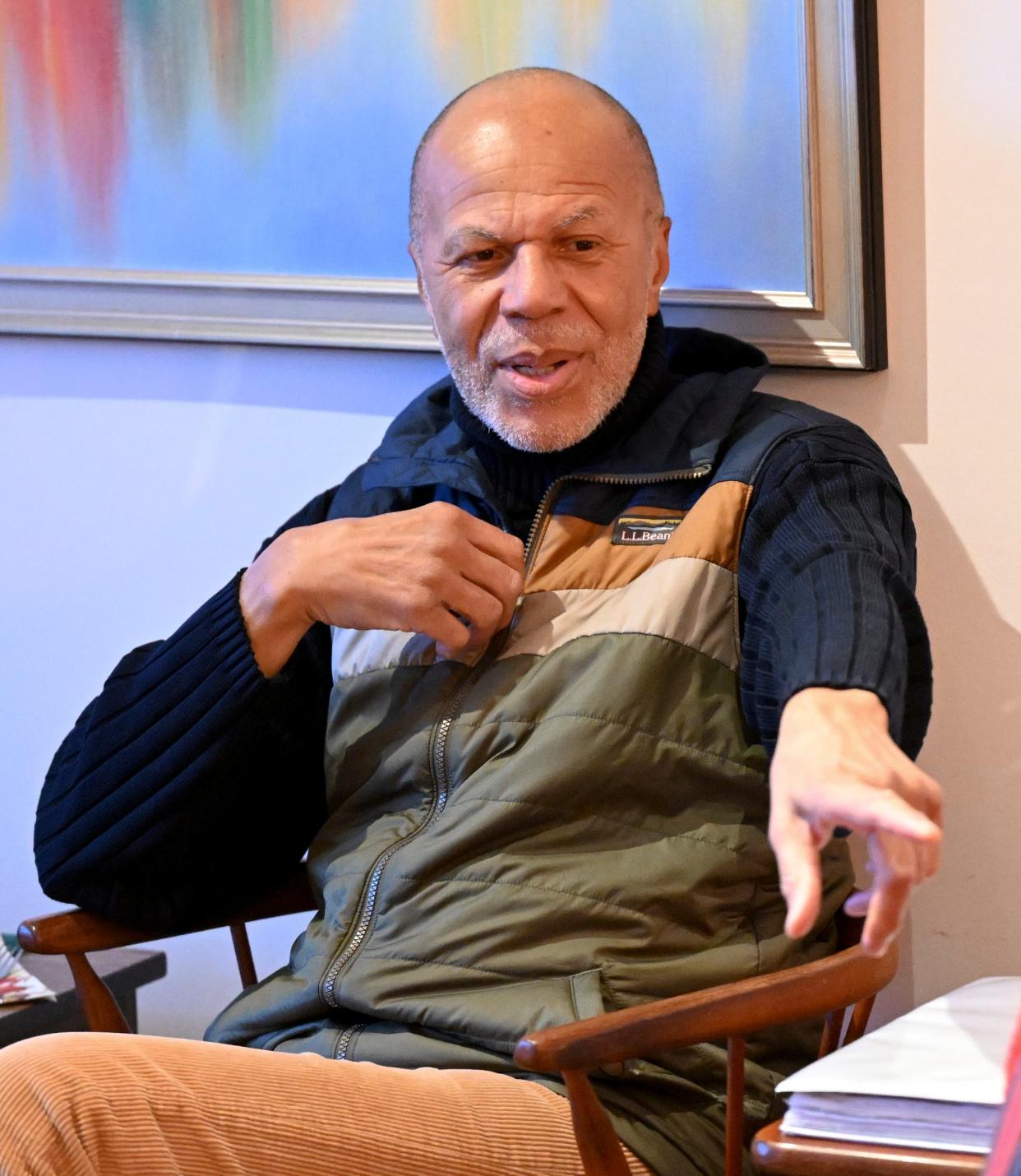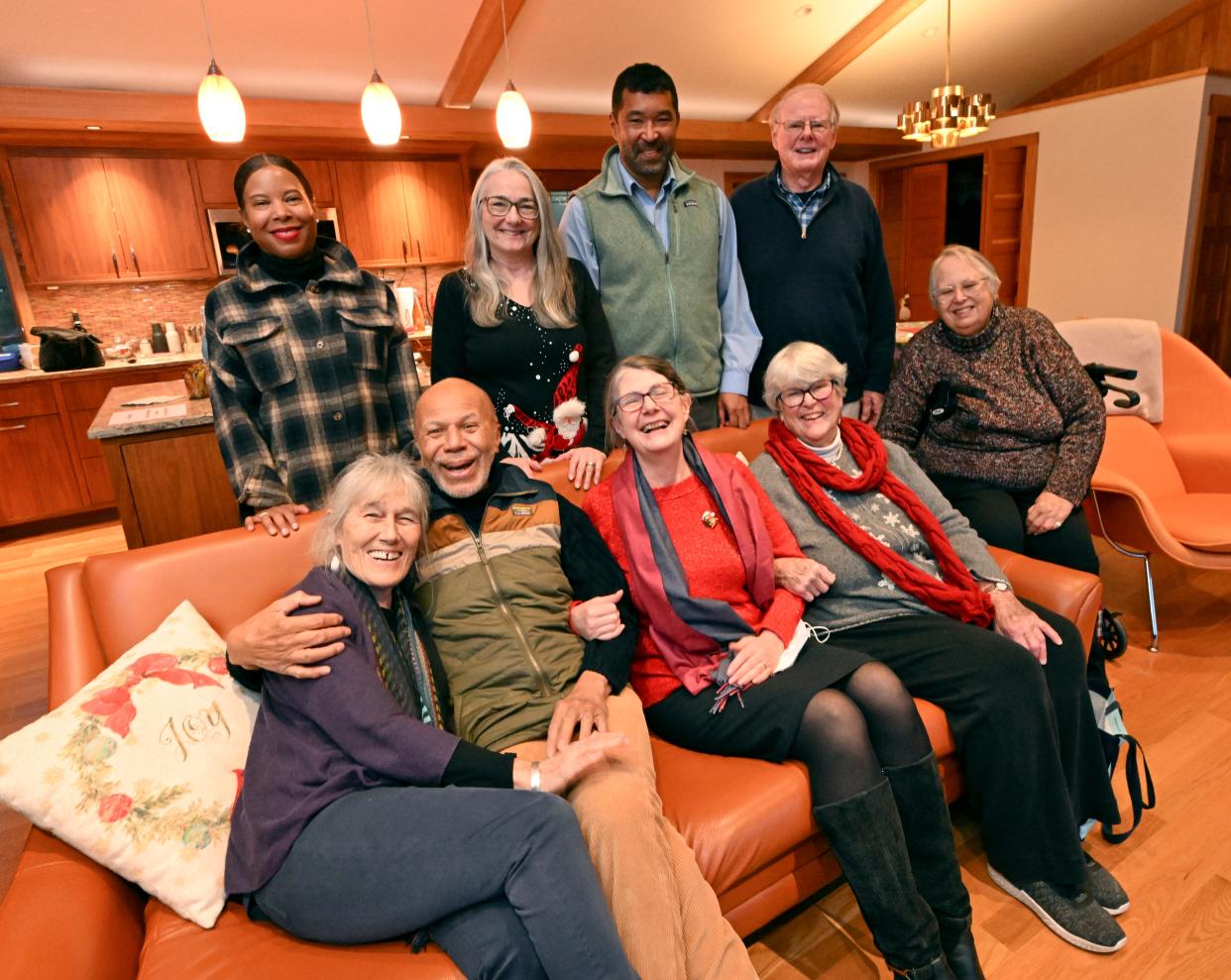Trust, partnership and empathy: Police Task Force makes real change on Lower Cape
During one of the first meetings of the Nauset Interfaith Association's Martin Luther King Action Team’s Police Task Force, Jeanne Morrison told the group that she was overcome with fear when she was pulled over in 2018 on Route 28 by a Yarmouth police officer.
The officer was ahead of her in traffic, she said, and pulled to the right side of the road. Morrison, who identifies as Black, was dressed in a hoodie and a ball cap at the time. As Morrison's vehicle slowly passed the officer, the police car pulled behind her in traffic. Its lights were flashing.
Morrison said she asked the officer why she was being pulled over. He seemed surprised to see Morrison, 64, and her mother Mary Morrison, 91, in the car, she said.
"He didn't answer me. Instead, he said, 'Is this your car?' I said, 'Yes, of course it's my car —you have my license and registration," said Morrison. "That fear turned to anger when I realized, I was just being harassed."

Morrison didn't receive a citation that day, she said. But the officer became increasingly defensive when she continued to ask him why she was pulled over.
"That's why we get so mad when something bad happens between a police officer and a person of color," said Morrison. "We have so many experiences of our own of being treated badly by police."
Morrison said she decided to help launch the Police Task Force, a concept which was initiated in 2020 by police chiefs in several Lower Cape towns. During monthly task force meetings, she said, community members who identify as people of color have shared similar experiences.
Sharing similar experiences
The group's mission, said Wes Williams, co-convener of the MLK Action team, is to talk and learn from one another and specifically focus on the experiences of Black, Indigenous, and people of color.
"George Floyd’s murder is what brought us together and the focus of the conversations have been on race and community policing," said Williams.
The chiefs approached the MLK Action Team after Floyd's death to see if they could talk with them about the negative perceptions of the police across the nation and on Cape Cod. Through the MLK Action team, community members participated in those conversations and the Police Task Force was initiated.
A community award
The Police Task Force will be honored with the Rosenthal Community Champion Award on Dec. 11 during the Barnstable County Human Rights Advisory Commission's 2023 International Human Rights Day celebration.
The Police Task Force is being recognized "for their dedicated efforts to enhance the relationship between the police and the communities they serve," according to the Human Rights Advisory Commission's website.
For Lesley Domínguez-Santos, Barnstable County Human Rights Advisory Commission coordinator, members of the task force have not only been brave enough to share their vulnerabilities with each other, they've also held difficult conversations that, over time, have impacted police policies and procedures on the Lower Cape.

What is the Rosenthal award?
The Rosenthal Community Champion Award focuses on honoring public servants who are working toward the greater good, said Domínguez-Santos.
Named after Irving Leopold Rosenthal, the award is given to individuals in the public sector who foster human rights concepts, and ideals.
The work of the Police Task Force is striking, said Domínguez-Santos because police chiefs within the task force have been so open to communication, and community members have taken the time to hold conversations about their racial experiences and concerns around community policing.
The Human Rights Commission will recognize the Police Task Force, including community members Jeff Spalter, chair of the Police Task Force; Morrison, who is also chair of the Barnstable Human Rights Advisory Commission; Becky Alden, Tia Cross, Pancheta Peterson, David Purdy, Deborah Ullman, and Williams. The award will also recognize Michael Anderson, chief of the Chatham Police Department; Heath Eldredge, chief of the Brewster Police Department; Scott MacDonald, chief of the Orleans Police Department; and David Guillemette chief of the Harwich Police Department; and former Chatham police chief Mark Pawlina. "They are coming up with concrete suggestions, policies and procedures," said Domínguez-Santos. "They are doing the work and it's creating real, impactful and lasting change in our community."
Conversations have been authentic but not easy
The first thing the group did at the first meeting, said Spalter, was a team building exercise. Everyone went around the room and shared their first experience with racism or their first experience interacting with a person of color.
Police chiefs were impressed by the honesty, said Spalter. One of the women in the group asked police why police officers are so rude, he said.
"It took the air out of the room,” he said. "She said, 'This is how you make me feel.'"
Over the years, the Police Task Force has touched upon issues like over-policing; the police-involved deaths of unarmed people like George Floyd, Brianna Taylor, Tyre Nichols, and Tamir Rice. The group also talked about the history surrounding the creation of the police, and struggles between police and Black, Indigenous, and people of color, Morrison said.
"We were spilling our guts on how we feel as people in our skin. How we feel interacting with white society," she said. "We shared our trauma."
At first, police chiefs were defensive, mad, and upset, she said. "And we were mad that they didn't understand."
Eldredge, of Brewster police, remembers that initially, community members and police "didn't see eye-to-eye."
Eventually, police chiefs saw the meetings as an opportunity to build bridges between their departments and underrepresented communities, he said.
"It was great for me to have trusted conversations with folks that could provide a different lens than what my life experience was," he said. "We realized what police looked like in their view, and what they wanted it to look like."
"Over time, one-by-one, they were getting it," said Morrison.
From a police perspective
Before the Police Task Force, Eldredge said the Brewster Police Department had a 10-year relationship with the Nauset Interfaith Association's Martin Luther King Action Team to help the community understand the police department's role surrounding immigration law.
"We wanted to get the message out that local police aren't here to enforce immigration law," he said. "There were a lot of misconceptions."
In the wake of Floyd's murder, said Eldredge, other departments wanted to try to do the same and work again with the MLK Action Team.
"At the end of day we are working together to create better relationships between police departments and the people we serve," he said."
Police Task Force meetings also gave the police chiefs a chance to share their perspective of what it's like to be a police officer; and why they have developed certain operating procedures and policies.
The conversations and social interactions developed an atmosphere of trust, partnership and empathy, said Morrison.
For Eldredge, the Police Task Force is a component of real community policing. Community policing is an philosophy, he said, that extends to every contact police have with members of the public. The community is the police and the police are the community, he said.
"We are members of community too," he said. "We take our uniform off at end of the day. We are just paid to do a job that everyone should be part of."
Through conversations, policies are changing
When Morrison shared her interaction with police in Yarmouth with the group, Eldredge said he was surprised that she was upset about being asked if the vehicle she was driving was her car.
"It's a routine question. We ask everybody that," said Eldredge.
But Morrison's perspective gave him pause.
Eldredge realized, he said, that it was unnecessary to ask that specific routine question. Instead, Brewster police officers are now trained to collect a person's driver's license and compare it to the vehicle's license plate information.
"Knowing the question can be perceived that way allows me to make a shift," he said.
The Police Task Force also analyzed an instance where Brewster police officers were called by a town resident because a person of color was driving through their neighborhood, said Morrison. The caller felt the person looked suspicious.
It turned out the man was visiting his girlfriend's parents and he was driving around trying to find a house. The girlfriend's father was outraged and he filed a complaint with police, said Morrison.
During the meeting, Morrison said police officers agreed that the call was a waste of police time and money. Through this instance and others, Morrison said police decided to come up with different ways to teach their officers how to perceive and define suspicious people.
"Now, that's real change," said Morrison.
Police Task Force looking to grow inter-generationally
While the Police Task Force has plans to hold conversations with the Provincetown Police Department and the Wellfleet Police Department, Spalter said the group is considering splinter groups that can meet with police departments in other areas of the Cape.
The group is also hoping to get young people involved, he said.
"The younger generation will be interacting with police for the next 50 years," he said. "We want to build positivity between police and younger people."
For Morrison, it's important to continue to build the Police Task Force, and address racial and other biases and reduce the tension between police and people of color, to avoid potential danger or harm.
"We've developed a model by having different conversations during a time when the country is in turmoil," she said. "And that's the beauty of having authentic conversations in a safe space. Things can change."
Rachael Devaney writes about community and culture. Reach her at rdevaney@capecodonline.com. Follow her on Twitter: @RachaelDevaney.
The Cape Cod Times is providing this coverage for free as a public service. Please take a moment to support local journalism by subscribing.
This article originally appeared on Cape Cod Times: Task force fosters amity between the public and Lower Cape police
